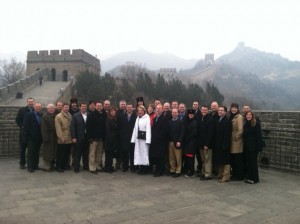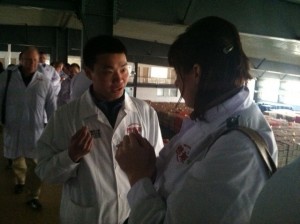The day started early, but after all, this is an IALP Seminar and there’s nothing uncommon about early mornings. Most classmates continue to marvel at the variety of foods offered at the breakfast buffet at the Kerry Hotel– both those foods common and no-so common to our palettes.
We boarded the motor coach and headed for the Great Wall at Badaling on our way to a corporate visit. If there was any question as to how the modern Chinese citizen developed their penchant for doing things big– that question has been answered. They inherited it. The Great Wall demonstrates that the Chinese have been successfully completing big infrastructure projects for centuries.
 The trip to the Great Wall gave us all a chance to test our physical fitness. Several class members learned the hard way that trying to climb to the highest point in sight was a feat easier contemplated from the ground than actually accomplished by the climb. Nevertheless, many pressed on and made it to the nearest peak in sight.
The trip to the Great Wall gave us all a chance to test our physical fitness. Several class members learned the hard way that trying to climb to the highest point in sight was a feat easier contemplated from the ground than actually accomplished by the climb. Nevertheless, many pressed on and made it to the nearest peak in sight.
Other class members decided to exercise the negotiating skills they learned at the Pioneer Communications Seminar in the fall of 2011. They did so with the purveyors of local souvenir shops. They jury is still out as to whether the shop keepers got the best of them or perhaps the other way around.
On the way to our next destination, we got the chance to see our first real glimpse of corn producing farms. The fields are small in size. It’s winter here, so corn isn’t growing in the fields. Most harvesting is done by hand and currently the farmers are going back into the fields and cutting the stalks. Then, they bundle the stocks and haul them away or pile them throughout the field to burn them.
Our next destination was the Deqingyuan Agriculture Technology Company (DQY), a commercial egg farm. We stopped first to tour and learn about their energy division. DQY uses digesters to process chicken manure. The waste is used to generate electricity that DQY sells back to the national grid. It is estimated that the total energy produced by the farm annually equals 14 million kilowatts–enough to power 20,000 homes for a year. The remaining waste by-product is dried and bagged and sold as fertilizer. DQY is not your average farm. Not by China’s standards; not by anyone’s standards.
 The people of China consume 300 billion eggs annually. Yes, that’s billion with a B and 300 with two zeros. DQY is one of 700,000 egg farms in the country. It far outproduces any other competitor with its annual production of 500 million eggs. Those 500 million eggs are all consumed within the City of Beijing and total 71 percent of the total branded eggs sold in the city. We were honored to see that company has welcomed us to their headquarters by flying the US flag next to the flag of China.
The people of China consume 300 billion eggs annually. Yes, that’s billion with a B and 300 with two zeros. DQY is one of 700,000 egg farms in the country. It far outproduces any other competitor with its annual production of 500 million eggs. Those 500 million eggs are all consumed within the City of Beijing and total 71 percent of the total branded eggs sold in the city. We were honored to see that company has welcomed us to their headquarters by flying the US flag next to the flag of China.
The company’s President, Zhongmin Zhong, presented us with a meal and tour of the National Egg Research Institute which is located on the farm. During his presentation, he informed us that “feeding the people of China is the number one priority.” However, his farm takes great strides to promote conservation and environmental stewardship. He encouraged us to promote the good things that we do as agriculturalists to ensure a safe environment for future generations.
IALF President, Joyce Watson offered an invitation to Mr. Zhong to visit and continue our conversations in Illinois in the future. Mr. Zhong was delighted with the invitation and also informed the group that his company has agreed to enter a joint venture with a US hog producer and open a concept pork farm in North Carolina. The farm will have an energy component similar to that of DQY in China.
After exchanging gifts with the staff of DQY, we boarded the motor coach for the final ride of the day. Destination: the Kerry Hotel in Beijing. This night will be our first “free night” of the trip and we’re all ready to explore Beijing. The “exchange of ideas” relating to what we’ve learned thus far in China and Hong Kong continues between the classmates. It has been said that there is a big difference between what you know and what you think you know. In many cases, we’ve changed our minds about what we thought we knew about China and the Chinese people. This “change of mind” is one that could only come about from the actual experience of visiting China.
No responses yet